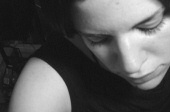September 11 case study
15 days after the World Trade Center disaster, she reported that the numbness and shock were passing, but that she was feeling depressed. The patient had little ambition or drive, she lacked energy, and she felt confused and disorganized. Her sleep had increased to more than 10 hours per day, and her sex drive was diminished. In exploring her reasons for not wanting a trial of medication, she described two fears. First, of becoming addicted and having to take medicine for the rest of her life (despite assurances that she would not be prescribed agents with any abuse potential); and second, that if she needed medicine she would consider herself, or be considered "weak and unable to cope on her own".
 She admitted, albeit reluctantly, that she was feeling the loss of her sister-in-law less intensely, and this was causing
her to feel guilty for not being more upset. She also reported a general lack of enjoyment in her life and continued
disruption in eating and sleeping. The number of her friends decreased as she continued to isolate herself.
She admitted, albeit reluctantly, that she was feeling the loss of her sister-in-law less intensely, and this was causing
her to feel guilty for not being more upset. She also reported a general lack of enjoyment in her life and continued
disruption in eating and sleeping. The number of her friends decreased as she continued to isolate herself.
The patient recognized that she had an abusive childhood; however, the recognition of a possible link between past events and current feelings was not enough for her to overcome some of her irrational fears. She was performing temp work after hearing a loud car accident in the street outside, and refused to return to the office, and remained fearful of going into New York City by herself. Later, her anxiety associated with hearing low flying planes improved, she made new friendships and socialized more outside of her house. She considered herself much improved when the therapy was terminated.




